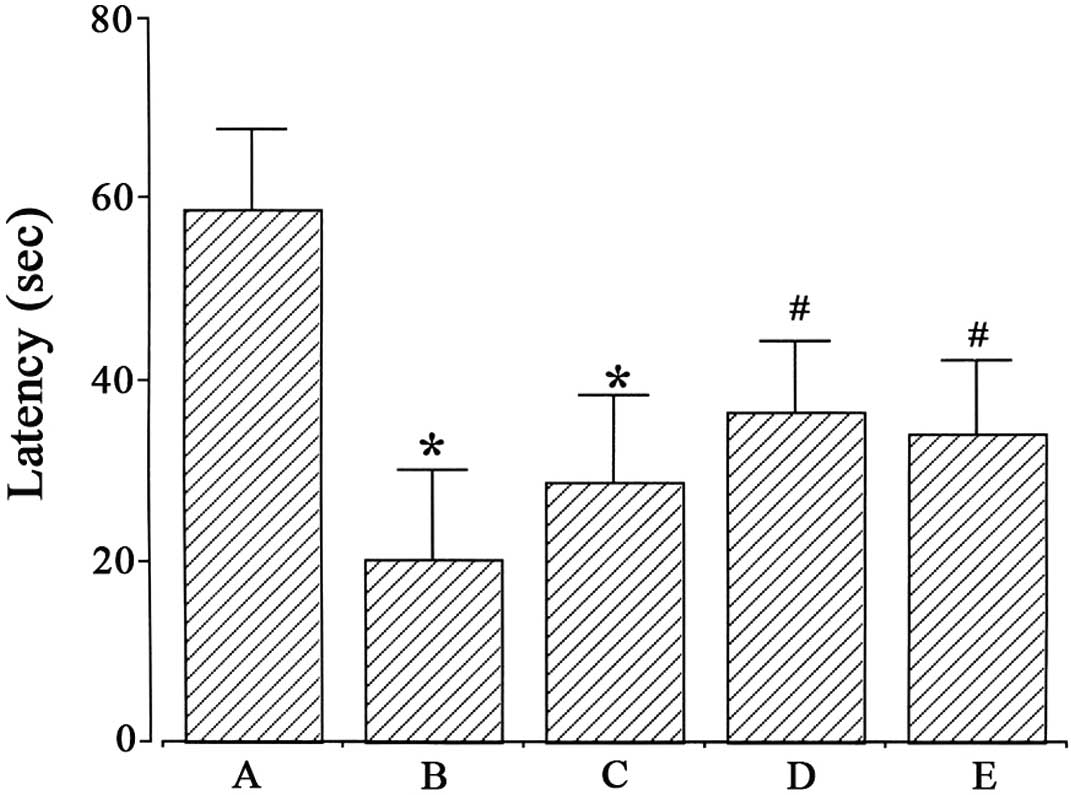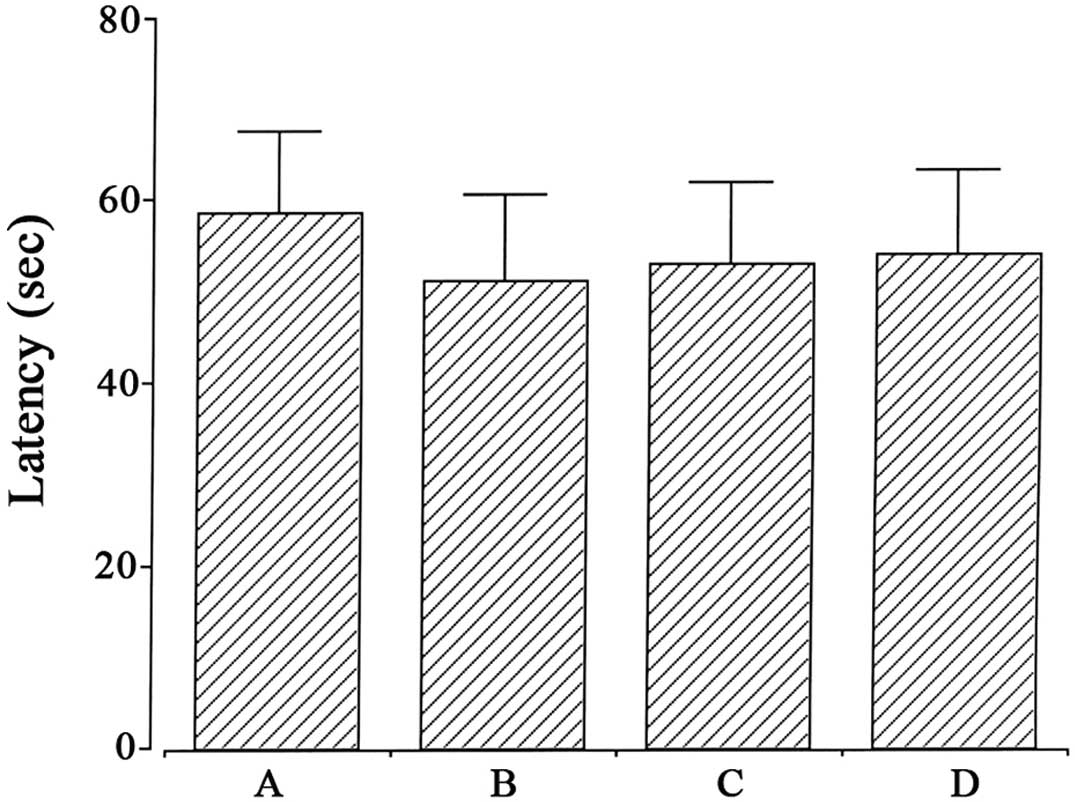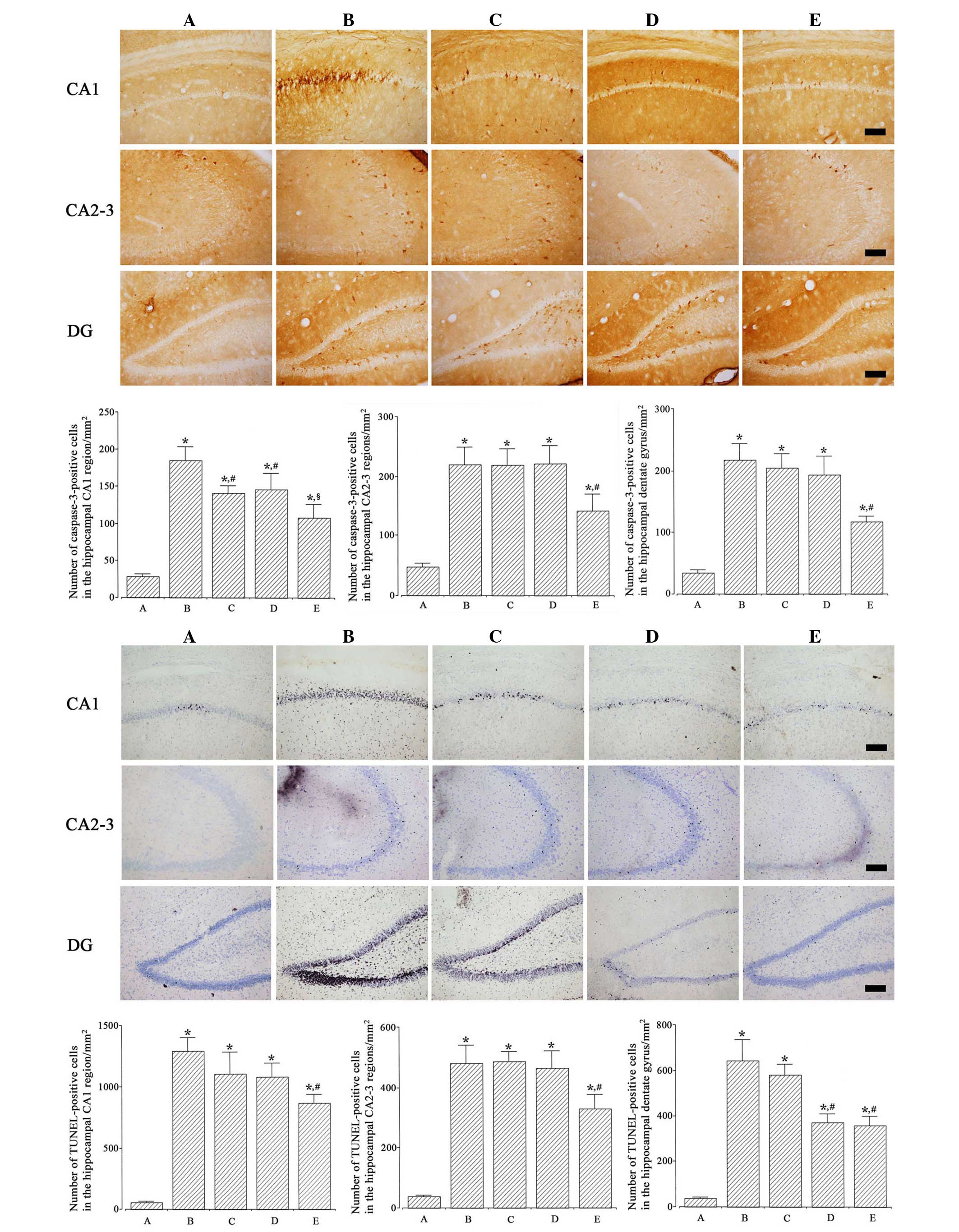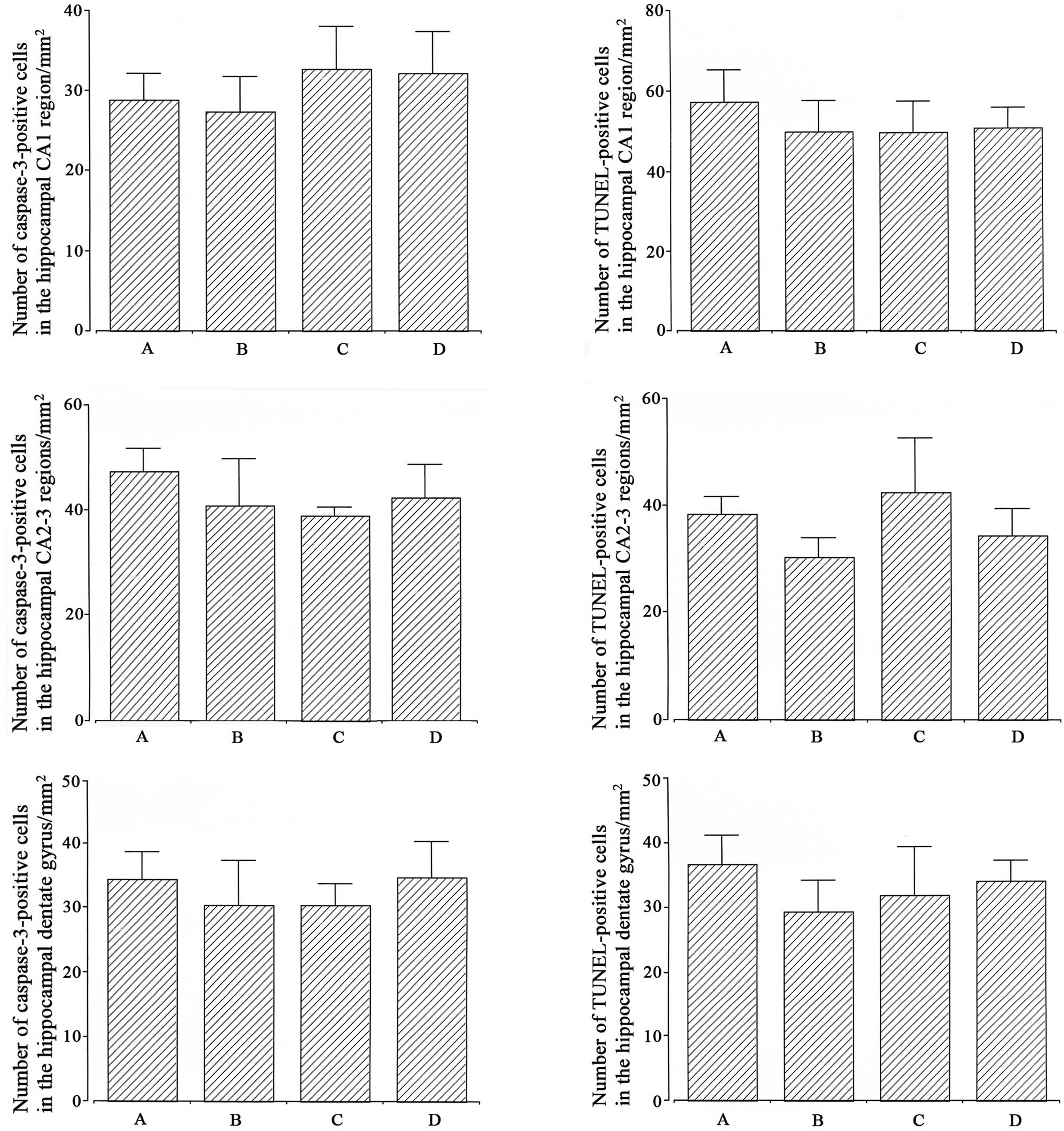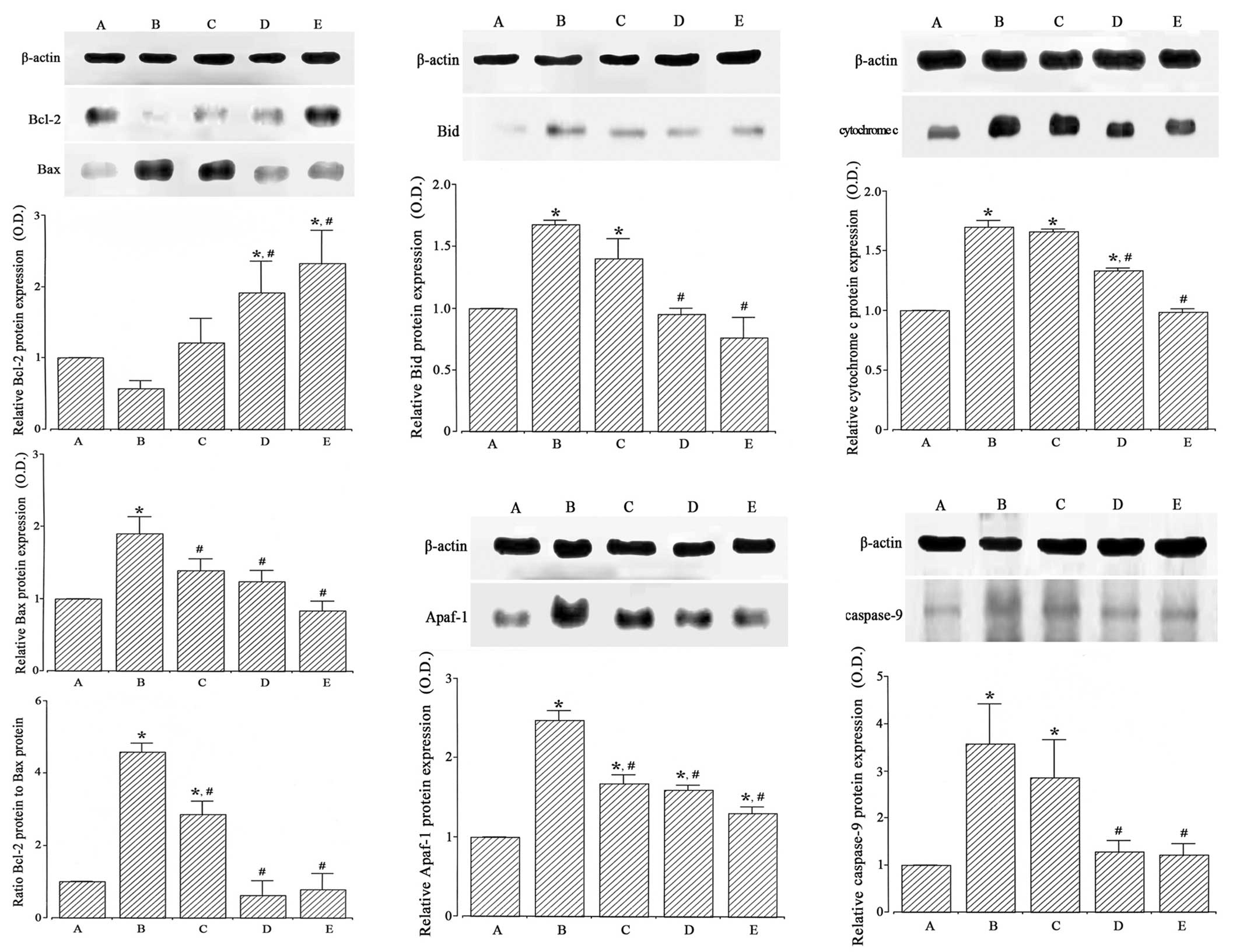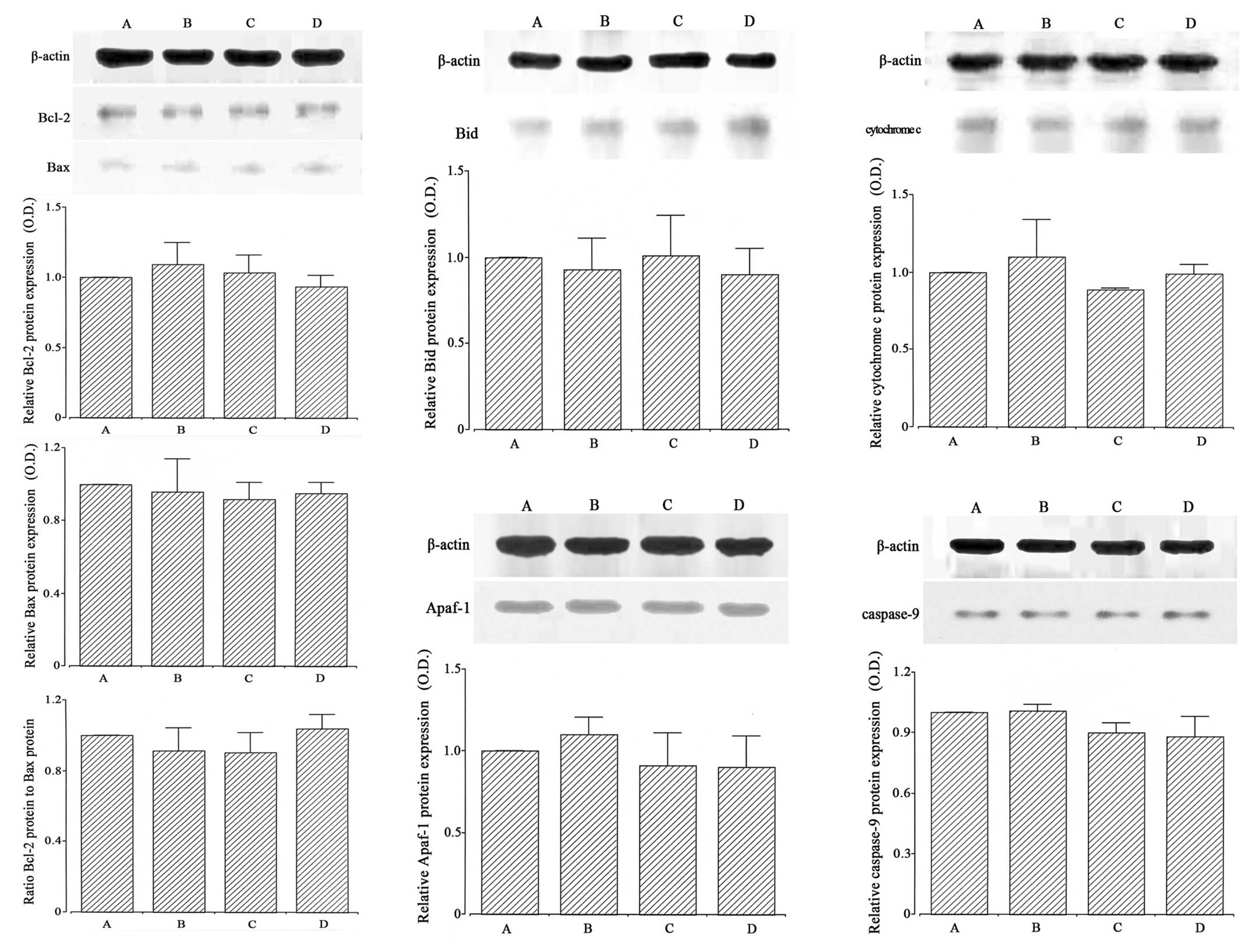|
1
|
González RG: Imaging-guided acute ischemic
stroke therapy: From ‘time is brain’ to ‘physiology is brain’. AJNR
Am J Neuroradiol. 27:728–735. 2006.PubMed/NCBI
|
|
2
|
McLean C and Ferriero D: Mechanisms of
hypoxic-ischemic injury in the term infant. Semin Perinatol.
28:425–432. 2004. View Article : Google Scholar : PubMed/NCBI
|
|
3
|
Pereira LO, Arteni NS, Petersen RC, da
Rocha AP, Achaval M and Netto CA: Effects of daily environmental
enrichment on memory deficits and brain injury following neonatal
hypoxia-ischemia in the rat. Neurobiol Learn Mem. 87:101–108. 2007.
View Article : Google Scholar : PubMed/NCBI
|
|
4
|
Ko IG, Shin MS, Kim BK, Kim SE, Sung YH,
Kim TS, Shin MC, Cho HJ, Kim SC, Kim SH, et al: Tadalafil improves
short-term memory by suppressing ischemia-induced apoptosis of
hippocampal neuronal cells in gerbils. Pharmacol Biochem Behav.
91:629–635. 2009. View Article : Google Scholar : PubMed/NCBI
|
|
5
|
Suh HJ, So SM, Na YG, Ko IG, Kim SE, Sung
YS, Shin MS, Kim CJ, Cho YS and Kim KH: Neuroprotective effects of
tamsulosin on intracerebral hemorrhage. Neural Regen Res.
6:2505–2510. 2011.
|
|
6
|
Mattson MP, Duan W, Pedersen WA and
Culmsee C: Neurodegenerative disorders and ischemic brain diseases.
Apoptosis. 6:69–81. 2001. View Article : Google Scholar : PubMed/NCBI
|
|
7
|
Thompson CB: Apoptosis in the pathogenesis
and treatment of disease. Science. 267:1456–1462. 1995. View Article : Google Scholar : PubMed/NCBI
|
|
8
|
Hwang L, Choi IY, Kim SE, Ko IG, Shin MS,
Kim CJ, Kim SH, Jin JJ, Chung JY and Yi JW: Dexmedetomidine
ameliorates intracerebral hemorrhage-induced memory impairment by
inhibiting apoptosis and enhancing brain-derived neurotrophic
factor expression in the rat hippocampus. Int J Mol Med.
31:1047–1056. 2013.PubMed/NCBI
|
|
9
|
Li Y, Chopp M, Jiang N, Zhang ZG and
Zaloga C: Induction of DNA fragmentation after 10 to 120 minutes of
focal cerebral ischemia in rats. Stroke. 26:1252–1257; discussion
1257–1258. 1995. View Article : Google Scholar : PubMed/NCBI
|
|
10
|
Reed CJ: Apoptosis and cancer: Strategies
for integrating programmed cell death. Semin Hematol. 37(4): Suppl
7. 9–16. 2000. View Article : Google Scholar : PubMed/NCBI
|
|
11
|
Benchoua A, Guégan C, Couriaud C, Hosseini
H, Sampaïo N, Morin D and Onténiente B: Specific caspase pathways
are activated in the two stages of cerebral infarction. J Neurosci.
15:7127–7134. 2001.
|
|
12
|
Kato H and Kogure K: Biochemical and
molecular characteristics of the brain with developing cerebral
infarction. Cell Mol Neurobiol. 19:93–108. 1999. View Article : Google Scholar : PubMed/NCBI
|
|
13
|
Zamzami N, Susin SA, Marchetti P, Hirsch
T, Gómez-Monterrey I, Castedo M and Kroemer G: Mitochondrial
control of nuclear apoptosis. J Exp Med. 183:1533–1544. 1996.
View Article : Google Scholar : PubMed/NCBI
|
|
14
|
Narita M, Shimizu S, Ito T, Chittenden T,
Lutz RJ, Matsuda H and Tsujimoto Y: Bax interacts with the
permeability transition pore to induce permeability transition and
cytochrome c release in isolated mitochondria. Proc Natl Acad Sci
USA. 95:14681–14686. 1998. View Article : Google Scholar : PubMed/NCBI
|
|
15
|
Love S: Apoptosis and brain ischaemia.
Prog Neuropsychopharmacol Biol Psychiatry. 27:267–282. 2003.
View Article : Google Scholar : PubMed/NCBI
|
|
16
|
Venn RM and Grounds RM: Comparison between
dexmedetomidine and propofol for sedation in the intensive care
unit: Patient and clinician perceptions. Br J Anaesth. 87:684–690.
2001. View Article : Google Scholar : PubMed/NCBI
|
|
17
|
Gertler R, Brown HC, Mitchell DH and
Silvius EN: Dexmedetomidine: A novel sedative-analgesic agent. Proc
(Bayl Univ Med Cent). 14:13–21. 2001.PubMed/NCBI
|
|
18
|
Laudenbach V, Mantz J, Lagercrantz H,
Desmonts JM, Evrard P and Gressens P: Effects of alpha(2)-agonist
adrenoceptor agonists on perinatal excitotoxic brain injury:
Comparison of clonidine and dexmedetomidine. Anesthesiology.
96:134–141. 2002. View Article : Google Scholar : PubMed/NCBI
|
|
19
|
Ma D, Hossain M, Rajakumaraswamy N, Arshad
M, Sanders RD, Franks NP and Maze M: Dexmedetomidine produces its
neuroprotective effect via the alpha 2A-adrenoceptor subtype. Eur J
Pharmacol. 502:87–97. 2004. View Article : Google Scholar : PubMed/NCBI
|
|
20
|
Zhang Y and Kimelberg HK: Neuroprotection
by alpham 2-adrenergic agonists in cerebral ischemia. Curr
Neuropharmacol. 3:317–323. 2005. View Article : Google Scholar : PubMed/NCBI
|
|
21
|
Dahmani S, Rouelle D, Gressens P and Mantz
J: Effects of dexmedetomidine on hippocampal focal adhesion kinase
tyrosine phosphorylation in physiologic and ischemic conditions.
Anesthesiology. 103:969–977. 2005. View Article : Google Scholar : PubMed/NCBI
|
|
22
|
Rajakumaraswamy N, Ma D, Hossain M,
Sanders RD, Franks NP and Maze M: Neuroprotective interaction
produced by xenon and dexmedetomidine on in vitro and in vivo
neuronal injury models. Neurosci Lett. 409:128–133. 2006.
View Article : Google Scholar : PubMed/NCBI
|
|
23
|
Kim SE, Ko IG, Park CY, Shin MS, Kim CJ
and Jee YS: Treadmill and wheel exercise alleviate
lipopolysaccharide-induced short-term memory impairment by
enhancing neuronal maturation in rats. Mol Med Rep. 7:31–36.
2013.PubMed/NCBI
|
|
24
|
Jeon JW, Lee JI, Shin HP, Cha JM, Joo KR,
Kim SH, Ko IG, Jin JJ, Kim SE and Kim CJ: Adenosine
A2A-receptor agonist polydeoxyribonucleotide promotes
gastric ulcer healing in Mongolian gerbils. Anim Cells Sys.
18:399–406. 2014. View Article : Google Scholar
|
|
25
|
Eser O, Fidan H, Sahin O, Cosar M, Yaman
M, Mollaoglu H, Songur A and Buyukbas S: The influence of
dexmedetomidine on ischemic rat hippocampus. Brain Res.
1218:250–256. 2008. View Article : Google Scholar : PubMed/NCBI
|
|
26
|
Sanders RD, Sun P, Patel S, Li M, Maze M
and Ma D: Dexmedetomidine provides cortical neuroprotection: Impact
on anaesthetic-induced neuroapoptosis in the rat developing brain.
Acta Anaesthesiol Scand. 54:710–716. 2010. View Article : Google Scholar : PubMed/NCBI
|
|
27
|
Choi JH, Kim TS, Park JK, Sim YJ, Kim K
and Lee SJ: Short-term treadmill exercise preserves sensory-motor
function through inhibiting apoptosis in the hippocampus of hypoxic
ischemia injury rat pups. J Exerc Rehabil. 9:457–462. 2013.
View Article : Google Scholar : PubMed/NCBI
|
|
28
|
Kim M, Cho KH, Shin MS, Lee JM, Cho HS,
Kim CJ, Shin DH and Yang HJ: Berberine prevents nigrostriatal
dopaminergic neuronal loss and suppresses hippocampal apoptosis in
mice with Parkinson's disease. Int J Mol Med. 33:870–878.
2014.PubMed/NCBI
|
|
29
|
Jemmerson R, Dubinsky JM and Brustovetsky
N: Cytochrome c release from CNS mitochondria and potential for
clinical intervention in apoptosis-mediated CNS diseases. Antioxid
Redox Signal. 7:1158–1172. 2005. View Article : Google Scholar : PubMed/NCBI
|
|
30
|
Engelhard K, Werner C, Eberspächer E,
Bachl M, Blobner M, Hildt E, Hutzler P and Kochs E: The effect of
the alpha 2-agonist dexmedetomidine and the N-methyl-D-aspartate
antagonist S(+)-ketamine on the expression of apoptosis-regulating
proteins after incomplete cerebral ischemia and reperfusion in
rats. Anesth Analg. 96:524–531. 2003. View Article : Google Scholar : PubMed/NCBI
|
|
31
|
Hu XL, Olsson T, Johansson IM, Brännström
T and Wester P: Dynamic changes of the anti- and pro-apoptotic
proteins Bcl-w, Bcl-2 and Bax with Smac/Diablo mitochondrial
release after photothrombotic ring stroke in rats. Eur J Neurosci.
20:1177–1188. 2004. View Article : Google Scholar : PubMed/NCBI
|
|
32
|
Chung JW, Seo JH, Baek SB, Kim CJ and Kim
TW: Treadmill exercise inhibits hippocampal apoptosis through
enhancing N-methyl-D-aspartate receptor expression in the
MK-801-induced schizophrenic mice. J Exerc Rehabil. 10:218–224.
2014. View Article : Google Scholar : PubMed/NCBI
|
|
33
|
Dave KR, Bhattacharya SK, Saul I, DeFazio
RA, Dezfulian C, Lin HW, Raval AP and Perez-Pinzon MA: Activation
of protein kinase C delta following cerebral ischemia leads to
release of cytochrome c from the mitochondria via bad pathway. PLoS
One. 6:e220572011. View Article : Google Scholar : PubMed/NCBI
|
|
34
|
Sugawara T, Fujimura M, Noshita N, Kim GW,
Saito A, Hayashi T, Narasimhan P, Maier CM and Chan PH: Neuronal
death/survival signaling pathways in cerebral ischemia. NeuroRx.
1:17–25. 2004. View Article : Google Scholar : PubMed/NCBI
|
|
35
|
Broughton BR, Reutens DC and Sobey CG:
Apoptotic mechanisms after cerebral ischemia. Stroke. 40:e331–e339.
2009. View Article : Google Scholar : PubMed/NCBI
|
|
36
|
Liu W, Tian F, Kurata T, Morimoto N and
Abe K: Dynamic changes of mitochondrial fusion and fission proteins
after transient cerebral ischemia in mice. J Neurosci Res.
90:1183–1189. 2012. View Article : Google Scholar : PubMed/NCBI
|
|
37
|
Cao G, Xiao M, Sun F, Xiao X, Pei W, Li J,
Graham SH, Simon RP and Chen J: Cloning of a novel
Apaf-1-interacting protein: A potent suppressor of apoptosis and
ischemic neuronal cell death. J Neurosci. 24:6189–6201. 2004.
View Article : Google Scholar : PubMed/NCBI
|
|
38
|
Xu XH, Hua YN, Zhang HL, Wu JC, Miao YZ,
Han R, Gu ZL and Qin ZH: Greater stress protein expression enhanced
by combined prostaglandin A1 and lithium in a rat model of focal
ischemia. Acta Pharmacol Sin. 28:1097–1104. 2007. View Article : Google Scholar : PubMed/NCBI
|
|
39
|
Han JH, Kim DO, Yi JW, Park SW, Kang WJ,
Choi YK, Kim SH, Ko IG, Jin JJ, Kim SE and Kim CJ: Dexmedetomidine,
α2-adrenoceptor agonist, does not induce apoptosis in
the brachial plexus of rats. Anim Cells Sys. 18:407–415. 2014.
View Article : Google Scholar
|















